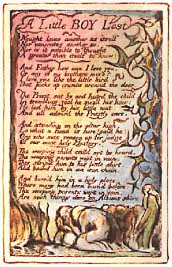Songs of Innocence and Experience Contents
- Social / political context
- Religious / philosophical context
- Literary context
- Textual history
- Songs of Innocence
- Introduction (I)
- The Shepherd
- The Ecchoing Green
- The Lamb
- The little black boy
- The Blossom
- The chimney sweeper (I)
- The little boy lost (I)
- The Little Boy Found
- Laughing song
- A Cradle Song
- The Divine Image
- Holy Thursday (I)
- Night
- Spring
- Nurse's Song (I)
- Infant Joy
- A Dream
- On Another's Sorrow
- Songs of Experience
- Introduction (E)
- Earth's Answer
- The Clod and the Pebble
- Holy Thursday (E)
- The Little Girl Lost
- The Little Girl Found
- The Chimney Sweeper (E)
- Nurse's Song (E)
- The Sick Rose
- The Fly
- The Angel
- The Tyger
- My Pretty Rose-tree
- Ah! Sun-flower
- The Lilly
- The Garden of Love
- The Little Vagabond
- London
- The Human Abstract
- Infant Sorrow
- A Poison Tree
- A Little Boy Lost (E)
- A Little Girl Lost
- To Tirzah
- The Schoolboy
- The Voice of the Ancient Bard
- A Divine Image
A Little Boy Lost (E) - Synopsis and commentary
Synopsis of A Little Boy Lost (E)

A child tells his natural father, or God the Father, his thoughts about love. These seem to contradict traditional Church teaching:
- Christians are urged to love others in the same way that they care for themselves
- The boy believes this it is not possible
- The boy believes this it is not possible
- According to the Bible, human beings can know God, who is greater than the human mind
- However, the child questions whether it is possible for the human mind (‘thought') to know something greater than itself
- However, the child questions whether it is possible for the human mind (‘thought') to know something greater than itself
- The Bible frequently enjoins believers to ‘love one another' in the same way that Jesus loved humanity (for which he ‘laid down his life')
- Yet the boy feels he cannot love beyond his natural capacity for love, just like a little bird which only has the capacity to eat crumbs (and, by implication, not huge slices of bread).
A priest hears the child and drags him off, which everyone interprets as his zeal and care for the welfare of the child. He accuses the boy publicly at the altar of being a devil because he uses his reason to judge the mysteries of faith. The child's weeping cannot be heard and the parents' grief is ineffective. The child is stripped, chained and burnt at the stake as a heretic. The speaker expresses his disbelief that this could happen in England.
Commentary
This poem has puzzled critics, who:
- Recognise Blake's typical rejection of tyranny which the poem illustrates
- Are puzzled by the opening denial that selfless love is possible.
In other respects, the child's opinions tally with what is known of Blake. He believed that:
- Human beings ‘can have no idea of anything greater than Man' (perhaps because God was within each person, or because of their limited, fallen perspective)
- A person is like a cup that ‘cannot contain more than its capaciousness' (in his notes on Swedenborg)
- Using the language of quantity in speaking of love (‘more'), as though it were a commodity, should be questioned. The child challenges the divided self's view of love which sees it as something to be possessed, weighed out and measured.
The child, then, would seem to be a victim who is destroyed because he challenges the system of ‘Mystery' that is produced by the human mind (as in The Human Abstract). This fallen mind has produced the image of a tyrannical God who demands obedience and human sacrifice. It is this perception which results in the persecution of the child.
The poem ends with a question. It can be read as a naïve expression of disbelief on the part of the speaker, or as a rhetorical question. Either way, it invites the answer ‘yes' and so does not allow the reader to evade the reality of the situation. Although innocent people may no longer be burnt for heresy by Blake's era, this does not mean that the life-denying consequences of ‘man-made' religion, with its thought-policing, is not active in the country.
Investigating A Little Boy Lost
- How valid do you think the child's arguments are?
